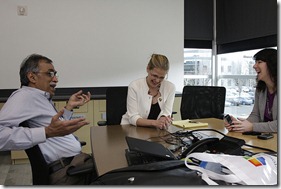In conversation with Diana Scearce, The Monitor Institute
Guest post By Elliot Harmon, staff writer for TechSoup
Elliot Harmon is a staff writer at TechSoup Global. He once traveled the US for three months on a greyhound bus. He tweets from @elliotharmon.
Since the TechSoup Global Contributors’ Summit was conceived as a chance for various networks that promote social change to connect and cross-pollinate, it’s not surprising that the power of networks has been a major theme.
Yesterday, Microsoft Community Affairs senior director Akhtar Badshah (pictured left) wrote about how Annie Leonard worked with a widespread, decentralized network of environmental organizations to produce and distribute the film The Story of Stuff, and how that same network continues to organize and collaborate online to promote environmental awareness around the world. Annie’s line, “If you like everyone in your network, then your network isn’t big enough,” was quoted in other sessions throughout the day and retweeted dozens of times on Twitter.
Later that day, I had the opportunity to sit in on a discussion between Akhtar and Diana Scearce, director of the Monitor Institute. The Monitor Institute works with social entrepreneurs around the world, supporting and incubating innovations to solve social and environmental problems around the world.
Diana had a lot to say about networks. Echoing Annie’s thoughts on decentralized communities, Diana made an interesting distinction between a network and a coalition. According to Diana, members of a network share similar guiding principles, but might have significantly different strategies. A coalition, on the other hand, is a smaller group with more closely aligned tactics.
Both networks and coalitions are ultimately necessary, but a network’s strength comes in its diversity of approaches. When Akhtar asked her what role technology plays in networks, Diana said that it allows people to collaborate with a much wider group of people.
Is more online connectivity weakening real-life connections? “That’s actually a little of a red herring,” according to Diana. “This is the world we live in. Technology isn’t going away.”
